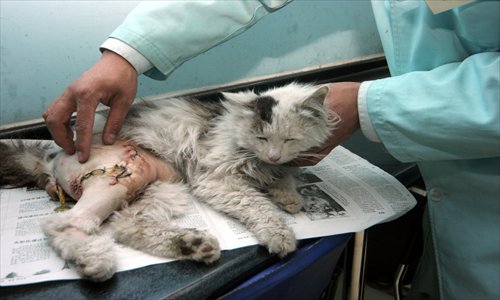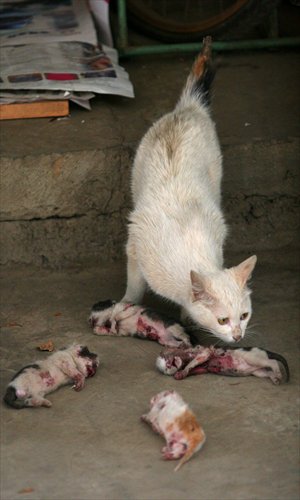The case of the kitten killer

Milky was a 2-month-old cream-colored kitten. It was cute innocent Milky that led people to a woman whose actions have shocked and angered people in Shanghai. The "Kitten Killer" in Zhabei district has probably killed scores of cats who had been given to her by people believing she would care for them and love them. But the "Kitten Killer" had other plans.
No one knows much about her. She is Zhou Ying, a 39-year-old Shanghai supermarket employee, but her cruelty has exposed what many see as a major failing in the law in China. Shanghai media reports that she has lost her job and has been evicted from her home by her landlord.
It was 56-year-old cat lover, who is known as Aunty He, that uncovered the horror. She had given the little kitten Milky to a good home, she believed. In early May Zhou got in contact with Aunty He on a social website. Aunty He used the website to write about the stray cats she collected from the streets, cared for and then found homes for. Zhou said she was a cat lover and wanted to adopt little Milky. She first contacted Aunty He on the social website and claimed to be a cat lover who was interested in adopting a kitten. Zhou took Milky home on May 8.
A shocking discovery
When Aunty He could not contact her again, she and a friend went to the address Zhou gave her two days later. But Zhou refused to let them into her apartment. Aunty He was suspicious. Something drove her to look in the garbage bin outside the apartment. It was there she found Milky, strangled in a snakeskin bag and squeaking plaintively. The kitten died within a few minutes.
The horror did not end there. There was another cat's bloodied body in the same garbage bin. Aunty He and her friend then found the mutilated body of a cat in nearby shrubbery.
Aunty He and her friend talked to the neighbors who confirmed that something bad was happening. But it was a garbage collector who told them the worst - almost every day that particular garbage bin had cat bodies in it. Sometimes there were as many as 12 bodies. One of the neighbors said she had seen Zhou bashing a small cat with a house brick.
A very upset Aunty He went home and began warning other cat lovers online about the horror. "It hurt to think that the stray cats that we rescued from the streets had ended up being killed," she said.
The message she posted online attracted scores of people who had given cats to Zhou. Eight cat lovers joined together on May 9 and that evening went together to confront Zhou. "We just wanted her to tell us what she did to our kittens and why she did it," Aunty He said.
Zhou had promised that the cats she adopted would be cared for in a large comfortable villa. There was no villa. Just a dirty untidy room. The protesters were angry and Zhou said she would call the police which is why they all arrived at a police station in Zhabei district within an hour. Alerted by the protesters, another 50 cat lovers soon arrived outside the police station.
When the police said there was nothing they could do because no laws had been broken, a lawyer came to the rescue and offered to help find a legal redress for the pet lovers.
Shen Ning, from the law firm Watson & Band, said: "What Zhou did was awful and should be punished. But I was worried that the cat lovers might act irrationally because of their anger. As a lawyer and a pet lover, I felt obliged to help them."
This week he asked for reports from anyone who had given a cat to Zhou for adoption. By Tuesday more than 20 had sent details of their contact with the woman and photographs of the kittens that they had left with her.
Because he believes many elderly people who are not on the Internet have given Zhou pets, Shen is writing to as many as he can contact to collect more evidence.
"It is unlikely that she can be charged with killing or cruelty to the animals because China doesn't have animal cruelty laws. But from the evidence I have collected so far I suspect Zhou has broken the criminal law in some way," he said.

Disappearing trick
Apparently Zhou had used two different cellphones to make contact with people who wanted to give her cats. The phones have been switched off for the past week and there have been no reports of Zhou being seen at work or around her old home.
A woman surnamed Pan is an organizer with the Shanghai Dogs and Cats Volunteers Group. She told the Global Times that Zhou had collected kittens from many people, promising to take care of them. Pan said she also collected cat food and was sometimes given money, perhaps as much as 10,000 ($1,575) yuan over the period.
Earlier Zhou claimed she had been adopting kittens for more than 10 years, picking up one a day sometimes. "She might have killed thousands. She adopted the cats from kindhearted people like Aunty He and people who no longer wanted their pets," said Pan.
There seems to be a large number of cats involved, many more than an individual who wanted to help the animals could handle. In her own home Aunty He looks after seven full-grown cats and 10 kittens. "Of course I hope people come to me to adopt cats. I can't take care of any more by myself. But if some of these cats are adopted, I go and help other stray cats."
When Zhou contacted her about adopting a kitten, Aunty He was delighted, believing she would be ideal. She was a Shanghainese who lived in a villa and loved cats. They did not sign any formal agreement.
The Shanghai Pets Adoption Center insists on formal contracts when it gives pets for adoption. "We ask people to fill in their personal information including their ID number. It would have been impossible for someone to adopt that many pets from us without being noticed," Zhong, one of the staff members at the center, said.
In the past, the center also had volunteers check on the pets and visit their new homes. This is no longer done but the new owners have to send the center five photos of their pets every month.
The founder of Jaiya's Animal Rescue, a nonprofit animal welfare group, Marvin Manalac, said that in the UK Zhou would have been fined and possibly jailed. In 1822 the British Parliament passed the first animal welfare laws in the world in the Act to Prevent the Cruel and Improper Treatment of Cattle.
"This is utterly shameful and disgusting. But unfortunately for animal lovers, we can do nothing but try our best to educate people, especially the younger generation. Hopefully, China will pass animal welfare laws soon," he said.
Many countries around the world, including Australia, Canada, India and the US, have enacted legislation which forbids cruelty to animals. China, however, has no national law or legislation for animal welfare. Nor is there any government-supported organization monitoring cases involving cruelty to animals.
In 2009 a forum to promote animal welfare legislation in China called for five freedoms for animals: freedom from hunger and thirst; freedom from discomfort; freedom from pain, injury or disease; freedom to behave naturally; and freedom from fear and distress.
Opinion polls on Sina and Sohu have shown that more than 80 percent of the respondents support animal welfare legislation, and above 75 percent say that people caught abusing animals should face criminal charges. Draft legislation on the prevention of cruelty to animals was submitted to the National People's Congress, China's top legislature, in 2009, but has yet to be introduced.
But not everyone believes this is the solution. Zhang Zaiyang, the director of the Shanghai Municipal Agricultural Commission, said earlier this week that simply passing or amending laws would not solve the problem of cruelty to animals.
"Society has not agreed on this yet. You can see from Zhou's case that the opinions of those who love animals and those who don't are extremist. It is not yet time to pass laws for animal welfare," he told the Global Times.
Lawyer Shen Ning disagrees. He said legislation should be ahead of its time. "If we wait until society is in agreement, we will lag behind. Lawmakers should have the wisdom to pass laws that serve more than the needs of the current society," said Shen.
The first of its kind
By becoming involved in Zhou's case, which might be the country's first case of its kind given the number of victims, Shen said he hoped to promote the development of legislation or regulations for animal welfare.
"A local regulation or law could be drafted in Shanghai at first, which after being tested and perfected, could be introduced throughout the country," he suggested.
Shanghai passed a new regulation on dogs last year. The regulation was intended to restrict dog ownership and control dog numbers in the city. It does not mention welfare or cruelty.
Research in the West has shown that many violent offenders start with acts of cruelty toward animals. People who abuse animals are five times more likely to commit violent crimes against humans, according to the Milwaukee Area Domestic Animal Control Commission, a US nonprofit organization dedicated to promoting community awareness and improving the welfare of homeless animals.
US expert Robert K. Ressler, who developed profiles of serial killers for the Federal Bureau of Investigation, said that murderers often started out as children killing and torturing animals.
Wang Yuru, the director of the Shanghai Psychology Society, said that people who tortured pets and small animals, in many cases, had high levels of aggression and resentment against society.
"They are usually obsessed with their problems but have no channels to express their bad feelings in an acceptable way. Instead they turn to extreme ways to act these out," she said.